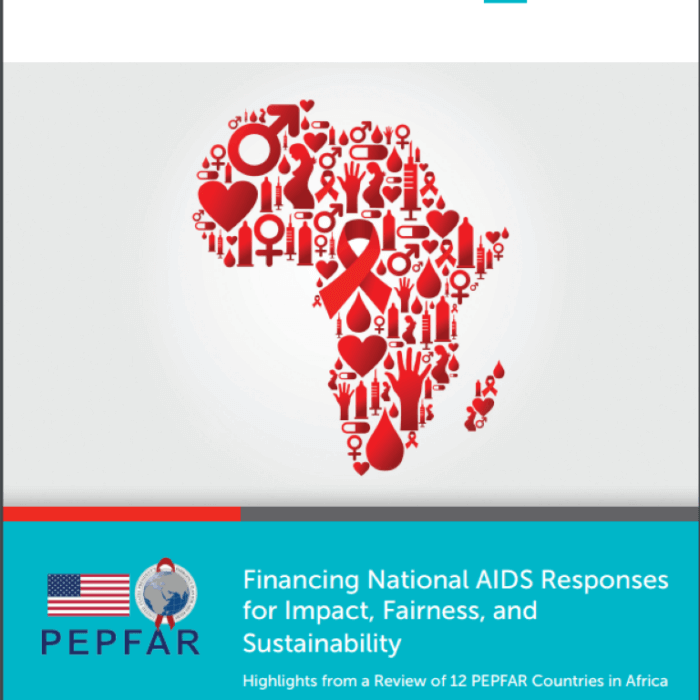The Challenge
In 2003, in response to the escalating global AIDS crisis, the U.S. Congress established the President’s Emergency Plan for AIDS Relief (PEPFAR). At the time of PEPFAR’s creation, an HIV diagnosis was a virtual death sentence in low- and middle-income countries. Despite many challenges, great progress has been made. To date, the U.S. Congress has appropriated more than $38 billion for PEPFAR, the largest global health initiative ever focused on a single disease. Working with host governments, civil society, and other external agencies, PEPFAR has prevented millions of new HIV infections, provided antiretroviral therapy to those already infected, and mitigated the negative effects of AIDS on communities and households around the world.
The Opportunity
As PEPFAR celebrates its accomplishments of the past decade, its leaders are working to adapt the program to a rapidly changing landscape. The increasing cost of fighting AIDS, coupled with flattening donor aid and greater economic growth in a number of the most heavily affected countries in recent years, are generating new opportunities to expand national ownership and funding of AIDS activities.
In this context, PEPFAR has begun to focus on developing a more long-term and sustainable global program by working with country governments to gradually and appropriately transfer responsibilities for AIDS financing and programming. PEPFAR and host country governments are working together to design medium-term financial and programmatic plans known as Partnership Framework Implementation Plans (PFIPs). These plans, which are based on the principles of joint efforts, including planning, budgeting, monitoring, and accountability, provide PEPFAR and country governments with an opportunity to create lasting AIDS programs that build upon the successes of the past decade and may help prevent the spread of HIV in the future.
In light of the many challenges to building strong partnerships, the Office of the Global AIDS Coordinator and the Centers for Disease Control has tapped the Results for Development Institute (R4D), through ICF International, to help create and guide the implementation of stronger financial frameworks in the PFIPs.
Our Work
R4D began its support to PEPFAR in late 2011 with three streams of work. The first two focus on improving the collaborations between the United States and the South African and Nigerian governments. The third stream involves assessing AIDS spending and financial sustainability in the 12 largest recipient counties of PEPFAR funding, all of them located in Africa.
Assisting the PEPFAR team based in Pretoria, South Africa, R4D has helped to establish AIDS spending targets over the next five years, targets that were incorporated in the PFIP, signed by the U.S. Ambassador to South Africa and South Africa’s Minister of Health in July 2012. Since that time, R4D has helped to improve expenditure tracking and measurement, increase the exchange of relevant financial and program data between PEPFAR and the South African Ministry of Health, and promote experimentation with joint annual planning and budgeting.
R4D’s work in Nigeria is similarly enabling the national government and the U.S. to better estimate, negotiate, and monitor financial commitments for AIDS. This partnership process will be tremendously important over the next few years, as Nigeria moves to fulfill its PFIP commitment to raise its annual domestic AIDS budget from less than $100 million to roughly $500 million.
In addition, R4D has conducted a major analysis of AIDS expenditures and financing in the 12 largest PEPFAR recipient countries in Africa. The study explores issues of country fair-share financing, resource allocations, funding gaps, and sustainability. The latter evaluates whether there are assured sources of financing from domestic and external sources to keep a strong national AIDS program going for the next 5-10 years. Preliminary findings from this study were presented at an international meeting in Geneva in November 2012. The study is scheduled to be published in 2013.
Looking Ahead
In June 2013, PEPFAR signed a modification to the original agreement with R4D (via ICF International) to extend R4D’s role in helping to shape this evolving AIDS financing landscape in order to ensure that efficient and high-impact prevention, treatment, and mitigation programs are supported in the coming years. Under the contract modification, R4D will further design and test collaborative approaches to shared financing in South Africa at the national and provincial levels. R4D will continue to provide technical support in Nigeria and will brief U.S. government officials and global policy-makers on its cross-cutting analysis of fair and feasible ways to share the financial burden of fighting AIDS.
R4D’s country work in South Africa and Nigeria can help pave the way for similar work in other countries heavily affected by AIDS. Beyond AIDS, R4D’s efforts to develop metrics, tools, and processes to increase country ownership of major health initiatives and reduce country dependence on outside donors may have broader applications in other areas of global health, such as immunization, nutrition, and family planning.














